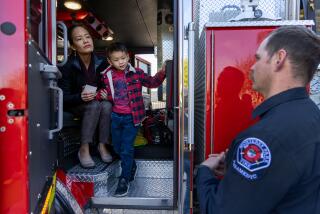Survivors Battle Breast Cancer With Awareness : Health: Women who have lived through the disease stress early detection and diagnosis as the keys in local rallies.
- Share via
Dolly Montalvo will always remember her 45th birthday--it was the day she was told she had breast cancer.
“It was not a nice birthday present,” she said.
Each year, 420 women in Ventura County find out they have breast cancer. The American Cancer Society estimates 100 of those women will die from the disease.
The numbers may be depressing, but the survival rate is much higher now than it was 10 years ago, said Dr. Ann Kelley, chief of medicine at Ventura County Medical Center.
After marching Saturday with a small group from the Futurecare Cancer Treatment Center in Oxnard to the Esplanade Mall, Kelley joined Montalvo and about 50 other people at a rally in the mall to inform women about breast cancer and announce that October is Breast Cancer Awareness Month.
A similar event was held Saturday in the east county, where participants marched from the Westlake Comprehensive Cancer Center to rally at a nearby park in Westlake Village.
Organizers chose the theme “Break the Silence” for the event. Despite their efforts to talk to women in the mall Saturday afternoon, many didn’t want to listen.
While children stared at the pink balloons and carnations, most women ignored the information booths and pushed strollers past the podium.
“People are scared to talk about this,” said Rita Mendoza, a 57-year-old cancer survivor from Oxnard. “It’s too real for them.”
So Mendoza and Montalvo, both members of the Oxnard-based Latina Breast Cancer Survivors, left the booth and shoved leaflets into the hands of shoppers who were walking past the tables.
Montalvo, who found a cancerous lump while examining herself in the shower, said people still think of a cancer diagnosis as a death sentence.
*
But she’s proof that it’s not.
“I’m a six-year survivor, going on seven,” said Montalvo, now 52, an office-skills instructor at Oxnard College. “When I told my family, they were devastated. It’s just like when someone dies, people don’t know what to say. Cancer is synonymous with death, but it doesn’t have to be any more.”
Now she uses her sense of humor to educate others.
While tending a prosthesis booth Saturday, Montalvo told a small group of customers, “The only thing you can’t do after surgery is be a topless dancer or nurse a child.”
While humor helps Montalvo talk about breast cancer, some women are reluctant to discuss it at all.
“Some women find a lump and they are too scared to go to the doctor,” said Karen Wright, an administrator at Futurecare Cancer Treatment Center. “We’re trying to create a sense of urgency, a sense of hope for women so they will do self-examinations that will lead to early diagnosis and to treatment.”
Kelley said misinformation is as dangerous as the silence that has always surrounded cancer, especially breast cancer. While she advocates a good diet and exercise for all patients, she said studies are divided on whether those factors alone can prevent cancer.
And other medical breakthroughs, such as the recent discovery of a breast cancer gene, raise new problems.
“Tracking of the gene will benefit women with a family history of the disease,” she said, “but insurance companies could also use gene testing to deny coverage to some women. There’s a lot of questions that will need to be addressed.”
*
Kelley advocates using gene testing to give “psychological relief” to women with a history of cancer in their families. But she emphasized that the only way a cure for cancer will be found is through research, which she called “tragically underfunded.”
“It’s not fast enough and it’s not good enough, but we’re working on it,” she said. “Women should know that treatment is there and it’s getting better all of the time.”
Montalvo, who has had two biopsies, a mastectomy and six months of chemotherapy, said a supportive family may be the most important factor.
“You need them just to be there to hug you when you need a hug, or to mop up the buckets of tears,” she said. “My husband loves me for me, not for my body parts. I hate to say this, but some husbands just can’t handle it and I worry about those women. I think my scar is beautiful.”
More to Read
Sign up for Essential California
The most important California stories and recommendations in your inbox every morning.
You may occasionally receive promotional content from the Los Angeles Times.













